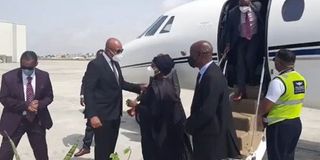Omamo in Mogadishu as Kenya, Somalia seek stronger ties

Kenya’s Foreign Affairs Cabinet Secretary Raychelle Omamo (centre) arrives in Mogadishu on August 8, 2021 on her maiden trip to Somalia.
Kenya’s Foreign Affairs Cabinet Secretary Raychelle Omamo has arrived in Mogadishu on her maiden trip to Somalia, even as country’s government moved to stall any possible agreements until after elections.
Ms Omamo is travelling to Mogadishu for the first time as Foreign minister in what Somali officials said was to deliver a special message and invitation to Somalia Prime Minister Hussein Roble to visit Kenya any time.
At the Aden Adde International Airport, she was received by her Somalia counterpart Mohamed Abdirizak and a number of senior government officials in Mogadishu.
The trip is the latest signal of thawing relations, and officials from both sides had said Prime Minister Roble could travel to Nairobi any time this month to continue talks on cementing ties that had only two months ago looked broken.
Yet there were still suspicions.
Farmaajo's decree on MoUs
On the eve of the trip, Somalia President Mohamed Abdullahi Farmaajo issued a decree banning the country’s government institutions from entering agreements or MoUs with foreign sides during the election season.
Effective July 7, 2021, the decree affects all biding bilateral or multilateral agreements or memorandums of understanding that affect the state’s policies, economy and security.
“This decree suspends, until elections are held, the state institutions including the executive and other institutions, from entering agreements with other countries, institutions and international companies,” the pronouncement said.
The directive, not a first in Somalia, forbids government ministries and other institutions from entering memorandums of understanding or talks that can impact the future of the country, its sovereignty, and the territorial and marine boundaries of the country.
“No commercial agreements can be entered with foreign parties in the course of the election season,” it added.
Farmaajo isn’t the first leader to issue a decree around elections.
In 2016, then President Hassan Sheikh Mohamud issued a directive delaying any deals until polls were held. The timing of this decision though, raises suspicions as to whether it was intended to forestall any commitments between the two sides.
Delayed elections
Somalia should have held elections eight months ago, but delays and wrangling have ensured the polls only began last week. They are supposed to run until October 10 when indirect presidential elections will be held in Mogadishu.
“The president urges all state institutions to respect the dignity, sovereignty and the progress achieved in recent years,” the decree further instructs.
Somalia’s Foreign Affairs and International Cooperation Minister Mohamed Abdirizak said that he will host CS Omamo, who will later brief Prime Minister Mohamed Hussein Roble before paying a courtesy visit to President Farmaajo.
Abdirizak indicated that Somalia and Kenya have been in contact recently.
“PM Roble and I met with the Kenyans during the inauguration of Djibouti President Ismaïl Omar Guelleh in the country’s capital city Djibouti in May,” said Abdirizak.
“We had also met the Kenyans during the London International Conference on Education (LICE-2021) that paved the way for CS Omamo’s visit,” he added, indicating that a delegation led by PM Roble will soon visit Kenya and meet President Uhuru Kenyatta.
Maritime border
But the trip by Omamo was immediately punctuated with rumours that the two sides could reach a tentative agreement on their maritime border, something that is also awaiting a decision of the International Court of Justice.
Though Kenya has always asked for an out of court settlement, the ICJ is expected to issue a final judgement any time from now after hearing the case since 2016. Somalia had sued in 2014 seeking to redraw the common maritime boundary in the Indian Ocean.
A source in the office of the PM told Nation.africa that the PM will continue pursuing stronger bilateral ties, in spite of the decree.
In fact, some analysts in Somalia think Farmaajo issued the decree to clear the air of rumours about a possible agreement on the maritime issue. The officials said there were other bilateral issues such as security, humanitarian and aviation and trade, whose discussions had stalled for more than two years.
Before Somalia took the case to the ICJ, the two countries had reached an MoU on negotiating the maritime boundary. And though the then transitional federal parliament of Somalia rejected it, the ICJ ruled that it was a valid bilateral agreement, but which did not forbid legal suits by either party.
Additional Reporting by Aggrey Mutambo





